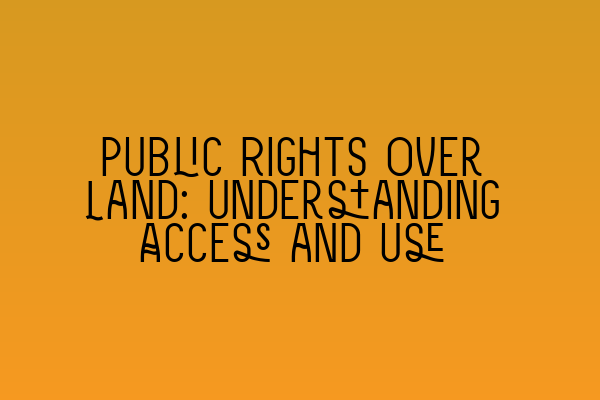Public Rights Over Land: Understanding Access and Use
Welcome to another informative blog post brought to you by SQE Property Law & Land Law. In this post, we will delve into the topic of public rights over land, focusing specifically on understanding access and use. Whether you are a property owner, a developer, or simply interested in property law, this article will provide you with valuable insights on this crucial aspect.
Before we proceed, we would like to direct your attention to some related articles that you may find interesting and helpful:
– Interactive SQE Mock Tests for Contract Law: Test Your Knowledge
– Parties in a Contract: Rights and Responsibilities
– The Importance of Ethics in Contract Law: A Comprehensive Guide
– Unveiling Duress and Undue Influence in Contracts
– Essentials of Consideration: Understanding the Backbone of Contracts
Now, let’s dive into the fascinating world of public rights over land.
Public rights over land refer to the legal entitlements granted to the general public to access and utilize certain parts of privately-owned land. These rights are crucial to ensure the proper functioning of society and to maintain a harmonious relationship between property owners and the public.
The most common types of public rights over land include rights of way, public footpaths, public bridleways, and town and village greens. Each of these rights serves a specific purpose and has its own legal framework governing its use.
Rights of way, for example, provide the general public with the right to travel across or along a specific route. These routes can include footpaths, bridleways, or even roads. It is important for property owners to be aware of any existing rights of way on their land, as they may have certain obligations to maintain these routes or ensure their accessibility to the public.
Public footpaths, on the other hand, are designated paths that allow pedestrians to traverse certain areas. These footpaths are usually marked and maintained by the local authorities, ensuring that they remain accessible to the public. Property owners must not obstruct or impede public footpaths unless they have obtained the necessary legal permission to do so.
Similarly, public bridleways are pathways specifically designated for horse riders and cyclists. These routes provide a safe and designated space for individuals to enjoy their preferred mode of transportation while also enjoying the natural surroundings. Property owners should be mindful of these rights and take care not to interfere with the public’s enjoyment of these bridleways.
Town and village greens are areas of land that have been traditionally used by the local community for recreational activities, such as sports and gatherings. These greens hold a special status in land law, and their preservation is important to maintain the cultural and historical heritage of the community. Property owners should be aware of any existing town and village greens on their land and respect the rights of the public to use them for recreational purposes.
Understanding and respecting public rights over land is crucial for property owners and developers to avoid legal complications and maintain positive community relations. By being aware of the various types of public rights and their implications, property owners can ensure that their land is appropriately managed while also upholding the public’s entitlement to access and use certain parts of it.
In conclusion, public rights over land play a vital role in our legal system, ensuring that the public has access to certain areas of privately-owned land for various purposes. Whether it’s a right of way, a public footpath, a bridleway, or a town and village green, these rights should be respected and upheld by property owners, developers, and the general public alike. By understanding and appreciating public rights over land, we can foster a harmonious relationship between property owners and the community, promoting the overall well-being of society.
We hope you found this article informative and valuable. If you have any questions or require legal assistance regarding public rights over land or any other property law matters, do not hesitate to contact the experts at SQE Property Law & Land Law. Our team of dedicated solicitors is here to assist you every step of the way.
Remember to check out the related articles mentioned above for further insights into different aspects of property law. Stay tuned for more informative blog posts from SQE Property Law & Land Law.
